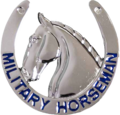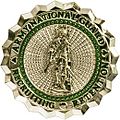Badges of the United States Army

Badges of the United States Army are military decorations issued by the United States Department of the Army to soldiers who achieve a variety of qualifications and accomplishments while serving on active and reserve duty in the United States Army.
As described in Army Regulation 670-1 Uniforms and Insignia, badges are categorized into marksmanship, combat and special skill, identification, and foreign.[1] Combat and Special Skill badges are further divided into six groups.[2]
A total of six combat and special skill badges are authorized for wear at one time on service and dress uniforms; this total does not include special skill tabs or special skill tab metal replicas.
Personnel may wear up to three badges above the ribbons or pocket flap, or in a similar location for uniforms without pockets. Personnel may only wear one combat or special skill badges from either group 1 or group 2 above the ribbons. Soldiers may wear up to three badges from groups 3 and 4 above the ribbons. One badge from either group 1 or group 2 may be worn with badges from groups 3 and 4 above the ribbons so long as the total number of badges above the ribbons does not exceed three.
Only three badges (from groups 3, 4, or 5) can be worn on the pocket flap at one time. This total does not include special skill tab metal replicas. Personnel will wear the driver and mechanic badges only on the wearer's left pocket flap of service and dress uniforms, or in a similar location on uniforms without pockets. Personnel may not attach more than three clasps to the driver and mechanic badges. The driver and mechanic badges are not authorized for wear on utility uniforms.
The order of precedence for combat and special skill badges are established only by group. There is no precedence for combat or special skill badges within the same group. For example, personnel who are authorized to wear the Parachutist and Air Assault badges may determine the order of wear between those two badges.[3]
The 21st century United States Army issues the following military badges (listed below in order of group precedence) which are worn in conjunction with badges of rank and branch insignia.
Combat and Special Skill Badges and Tabs
[edit]Source:[2]
Group 1
[edit]Group 2
[edit]Group 3
[edit]-
Army Astronaut Badges (Any Army Aviator, Flight Surgeon, or Aviation Badge with Astronaut Device)
Group 4
[edit]Group 5
[edit]-
Distinguished International Shooter Badge
-
Distinguished Shooter Badges
-
Interservice Competition Badges
-
Excellence-In-Competition Badges
-
Marksmanship Qualification Badges
Group 6
[edit]-
Physical Fitness Excellence Award
Identification Badges
[edit]Other Accoutrements
[edit]National Guard Badges
[edit]-
National Guard Bureau Organizational Badge*
Notes
[edit]- * = also issued to Air Force airmen
- ** = also issued to airmen and Space Force guardians
- No asterisk indicates that the badge is issued only to soldiers
See also
[edit]- Distinctive unit insignia (U.S. Army)
- Military badges of the United States
- Identification badges of the United States military
- Obsolete badges of the United States military
- Shoulder Sleeve Insignia (United States Army)
- Tabs of the United States Army
- Uniforms of the United States Army
- United States military beret flash
- List of United States Army careers
- United States Army branch insignia
- All insignia of the United States Army
References
[edit]- ^ "Army Regulation 670-1, Wear and Appearance of Army Uniforms and Insignia, Chapter 22" (PDF). Department of the Army. January 26, 2021. Retrieved July 17, 2023.
- ^ a b "Army Pamphlet 670-1, Guide to the Wear and Appearance of Army Uniforms and Insignia, Chapter 22, Section 16, Paragraph a" (PDF). Department of the Army. January 26, 2021. Retrieved July 17, 2023.
- ^ "Army Pamphlet 670–1, Guide to the Wear and Appearance of Army Uniforms and Insignia, Chapter 22, Section 16, Paragraph c" (PDF). Department of the Army. January 26, 2021. Retrieved March 20, 2023.
- ^ "Vermont National Guard Permanent Order 121-01". Archived from the original on September 29, 2011. Retrieved April 21, 2011.
- ^ National Guard Regulation 672-3 and Air National Guard Regulation 900-1, National Guard Chief's 50 Marksmanship Badge Archived 2013-05-31 at the Wayback Machine, dated 1 February 1978, last accessed 26 March 2014
- ^ Tabs and Badges a Measure of Missouri Guardmembers' Marksmanship Archived March 12, 2011, at the Wayback Machine, Missouri National Guard Public Affairs, by Ann Keyes, last accessed 1 March 2015
- ^ Tabs and Badges a Measure of Marksmanship Archived 2014-05-18 at the Wayback Machine, Missouri National Guard, dated 14 December 2010, last accessed 18 May 2014
External links
[edit]- Army Regulation 670-1: Wear and Appearance of Army Uniforms and Insignia (PDF file)
- Army Regulation 600-8-22: Military Awards (PDF file)
- Army Service Uniform - Ribbons Poster (PDF file)
































![Ram's Head Device (VT NG)[4]](http://upload.wikimedia.org/wikipedia/commons/thumb/b/b3/Ramshead_Device%282%29.jpg/120px-Ramshead_Device%282%29.jpg)
![Chief's 50 Marksmanship Badge[5]](http://upload.wikimedia.org/wikipedia/commons/thumb/d/de/Chiefs_50_Marksmanship_Badge.png/82px-Chiefs_50_Marksmanship_Badge.png)
![Adjutant General's Twenty Combat Badge (MO NG)[6][7]](http://upload.wikimedia.org/wikipedia/commons/thumb/3/3a/Missouri_Adjutant_Generals_20_Combat_Badge.png/111px-Missouri_Adjutant_Generals_20_Combat_Badge.png)


